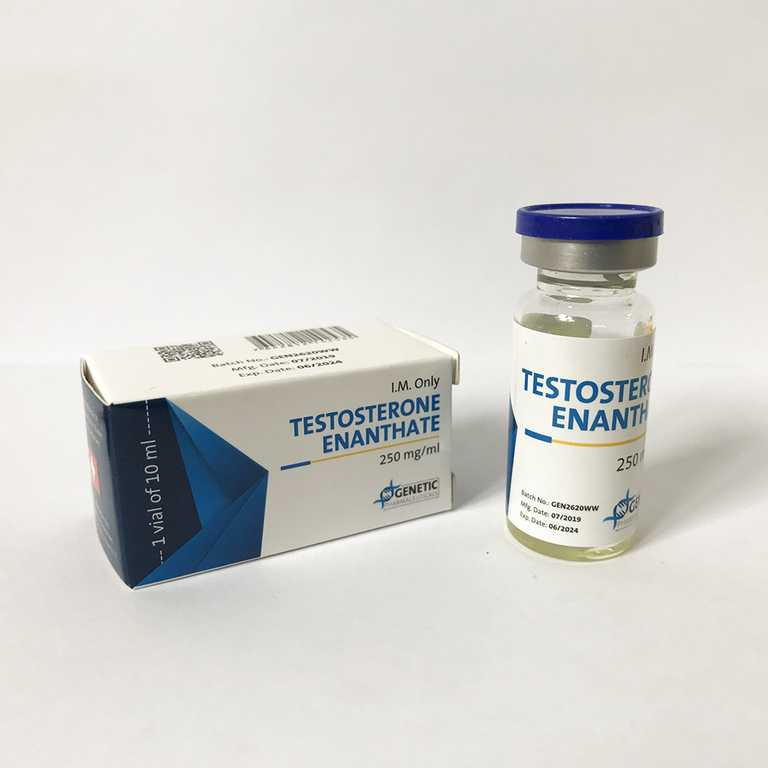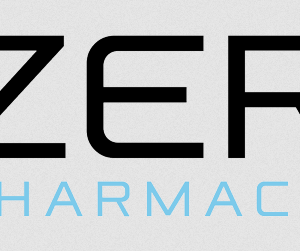TESTOSTERONE ENANTHATE GENETIC 10ml
$50.00 Original price was: $50.00.$45.00Current price is: $45.00.
Package: 1 vial (250mg/ml 10ml)
Active Substance: Testosterone Enanthate
Testosterone Enanthate from Genetic Pharmaceuticals is a popular injectable anabolic steroid. Known for its effectiveness in increasing muscle mass, strength, and overall physical performance, Testosterone Enanthate is a cornerstone in the world of bodybuilding and athletics. This comprehensive guide will delve into the details of Testosterone Enanthate, covering its indications, contra-indications, administration, medical action, precautions, side effects, overdosage, and concluding remarks.
Indication
Testosterone Enanthate is primarily indicated for individuals seeking to enhance muscle mass, strength, and overall physical performance. It is particularly beneficial during bulking cycles, where the goal is to achieve significant muscle growth and strength gains. Additionally, Testosterone Enanthate is used in hormone replacement therapy (HRT) for men with low testosterone levels, helping to restore normal hormonal balance and improve quality of life.
In bodybuilding, Testosterone Enanthate is valued for its ability to promote substantial muscle hypertrophy, improve recovery times, and enhance performance. It is especially useful for those seeking to break through plateaus and achieve remarkable gains in size and strength. For therapeutic use, it addresses symptoms of low testosterone such as fatigue, depression, and reduced libido, thereby enhancing overall well-being.
Contra-indications
Testosterone Enanthate is not suitable for everyone and should be avoided by individuals with certain health conditions. It is contraindicated in patients with prostate cancer, breast cancer, or any androgen-sensitive conditions. Those with severe liver or kidney disease should avoid using Testosterone Enanthate, as it can exacerbate these conditions. It is also not recommended for individuals with a history of cardiovascular issues, as it can affect cholesterol levels and increase the risk of heart problems.
Pregnant or breastfeeding women should not use Testosterone Enanthate due to potential risks to the fetus or infant. Additionally, individuals with known hypersensitivity to any components of the testosterone blend should avoid using this steroid. Consulting with a healthcare provider before starting Testosterone Enanthate is crucial to ensure it is safe and appropriate for your specific health condition.
Administration
Testosterone Enanthate is administered via intramuscular injection. The dosage varies depending on the individual’s goals, experience level, and response to the steroid. For bodybuilding purposes, the typical dosage ranges from 200 to 600 milligrams per week, administered once or twice weekly. Beginners are advised to start at the lower end of the dosage spectrum to assess their tolerance and minimize the risk of side effects.
Testosterone Enanthate has a long half-life, allowing for less frequent injections compared to other testosterone esters. Cycle lengths typically range from 10 to 12 weeks. It is important to follow the prescribed dosage and administration guidelines to achieve the desired effects while minimizing potential risks.
Medical Action
Testosterone Enanthate works by increasing the levels of testosterone in the body, which is essential for muscle growth, strength, and overall physical performance. Testosterone is the primary male sex hormone responsible for the development of male characteristics and the maintenance of muscle mass and bone density.
Testosterone Enanthate enhances protein synthesis and nitrogen retention in muscles, promoting muscle hypertrophy and recovery. It also increases red blood cell production, improving oxygen delivery to tissues and enhancing endurance and performance. One of the key benefits of Testosterone Enanthate is its ability to improve mood, energy levels, and libido, making it beneficial for individuals with low testosterone levels.
Precautions
Using Testosterone Enanthate requires several precautions to ensure safe and effective use. Regular monitoring of liver and kidney function is essential, as prolonged use can strain these organs. It is important to keep track of cholesterol levels, as Testosterone Enanthate can negatively impact lipid profiles, increasing the risk of cardiovascular issues. Maintaining a healthy diet and exercise regimen is crucial to support overall health and minimize potential risks. Users should avoid alcohol and other hepatotoxic substances while using this steroid.
Consulting with a healthcare provider before and during use is highly recommended to ensure safe administration and monitor any potential side effects. Proper sterile injection techniques should be used to prevent infections. Additionally, users should be aware of the potential psychological effects of Testosterone Enanthate, including increased aggression and mood swings, and take steps to manage these effects responsibly.
Side Effects
As with all anabolic steroids, Testosterone Enanthate can cause side effects. Common side effects include acne, oily skin, and increased body hair growth due to its androgenic properties. Some individuals may experience hair loss if they are genetically predisposed to male pattern baldness. Testosterone Enanthate can also cause water retention and high blood pressure, which can increase the risk of cardiovascular problems.
Androgenic Side Effects
The androgenic side effects of Testosterone Enanthate include acne, oily skin, and increased body hair. Women using Testosterone Enanthate may experience virilization symptoms, such as deepening of the voice, increased body hair, and menstrual irregularities. Although Testosterone Enanthate does not aromatize into estrogen, it can still cause androgenic side effects like aggression and mood swings.
Cardiovascular Side Effects
Testosterone Enanthate can negatively impact cholesterol levels, increasing LDL (bad cholesterol) and decreasing HDL (good cholesterol). This can raise the risk of cardiovascular issues, such as heart attack and stroke. Monitoring cholesterol levels and maintaining a heart-healthy diet and exercise regimen are essential while using Testosterone Enanthate.
Hepatotoxicity
While Testosterone Enanthate is not known to be highly hepatotoxic, prolonged use or high doses can still strain the liver. Regular liver function tests are recommended to monitor for any signs of liver damage. Avoiding alcohol and other hepatotoxic substances is crucial to protect liver health.
Overdosage
Overdosage of Testosterone Enanthate can lead to severe health complications. Symptoms of overdose may include severe headaches, nausea, vomiting, liver pain, and jaundice (yellowing of the skin or eyes) due to liver damage. Prolonged or excessive use can cause irreversible side effects such as liver tumors or significant cardiovascular issues. If an overdose is suspected, immediate medical attention is crucial. Adhering to the prescribed dosage and cycle length is essential to avoid the risk of overdose and associated health issues. Users should never exceed the recommended dose or extend their cycle length without consulting a healthcare professional. Regular monitoring and responsible use are key to preventing overdose and its serious consequences.
Conclusion
Testosterone Enanthate from Genetic Pharmaceuticals is a potent injectable anabolic steroid known for its powerful muscle-building, strength-enhancing, and performance-boosting properties. Its long half-life and sustained release make it an effective choice for bodybuilders and athletes aiming for significant gains. However, due to its potential side effects and health risks, it should be used responsibly and under the guidance of a healthcare professional.
By following proper dosage guidelines, taking necessary precautions, and monitoring health parameters, individuals can achieve significant benefits from Testosterone Enanthate while minimizing risks. Always consult with a healthcare provider before starting any steroid regimen to ensure it is appropriate for your health and fitness goals. Overall, Testosterone Enanthate offers a powerful and effective solution for those looking to enhance their physique and performance, provided it is used responsibly and with proper medical supervision.
Popular Brands
Popular Categories
-

Winstrol/Stanozolol10 Products
-

Turanabol/4-Chlorodehydromethyltestosterone7 Products
-

Trenbolone Mix8 Products
-

Trenbolone Enanthate9 Products
-

Trenbolone Acetate7 Products
-

Testosterone Propionate8 Products
-

Testosterone Mix14 Products
-

Testosterone Enanthate8 Products
-

Testosterone Cypionate7 Products
-

Primobolan7 Products
-

Parabolan9 Products
-

Oral Steroids48 Products
-

Nandrolone Phenylpropionate7 Products
-

Nandrolone Decanoate6 Products
-

Injectable Steroids137 Products
-

Injectable Mix11 Products
-

Drostanolone Propionate7 Products
-

Drostanolone Enanthate8 Products
-

Dianabol/Methandienone9 Products
-

Boldenone Equipoise9 Products
-

Anavar/Oxandrolone10 Products
-

Anadrol/Oxymetholone5 Products











Reviews
There are no reviews yet.